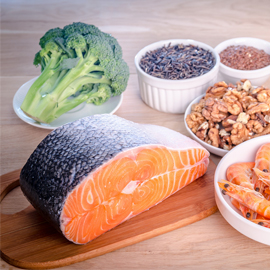Know which Dietary fats to choose
May 2010
 Although low-fat diets were the trend for years, you can actually eat some fats and still lose weight and be healthy. In fact, eating the right types of fat in moderation can actually be good for you and help lower your total cholesterol. Find out which fats to include in your diet and which ones to avoid.
Although low-fat diets were the trend for years, you can actually eat some fats and still lose weight and be healthy. In fact, eating the right types of fat in moderation can actually be good for you and help lower your total cholesterol. Find out which fats to include in your diet and which ones to avoid.
The “Bad” Fats
First, there are some fats you should avoid whenever possible: saturated fats and trans fats. These fats can raise your total cholesterol and increase your risk for heart disease if eaten too often. Foods that contain these fats include:
- Saturated fat: Animal products like dairy and dairy products, eggs, poultry, meat, and seafood; palm and other tropical oils.
- Trans fat: Partially hydrogenated vegetable oils, fried foods, commercial baked goods, margarine, and shortening.
While the Nutrition Facts labels on your foods will list saturated fat contents, you should also check the ingredient list to make sure none of these items are used.
The “Good” Fats
To reduce your risk for heart disease, replace saturated and trans fats with unsaturated fats, including monounsaturated and polyunsaturated fats and omega-3 fatty acids, a special type of polyunsaturated fat. These healthier fats can be found in:
- Monounsaturated fat: Olive oil, canola oil, avocados, peanut oil, and nuts and seeds.
- Polyunsaturated fat: Nuts, seeds, and vegetable oils.
- Omega-3 fatty acids: Fatty, cold-water fish like herring and salmon; flaxseeds, flax seed oil, and walnuts.

